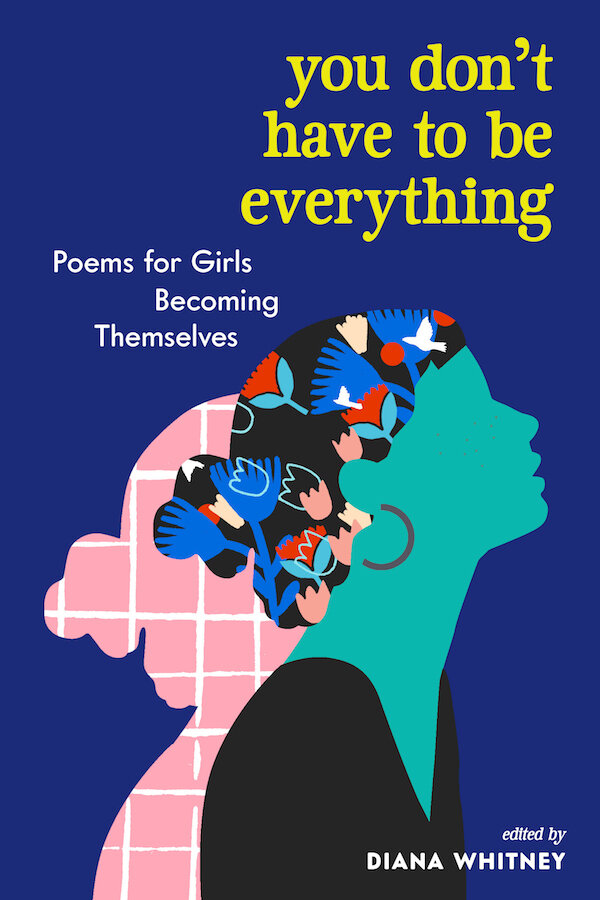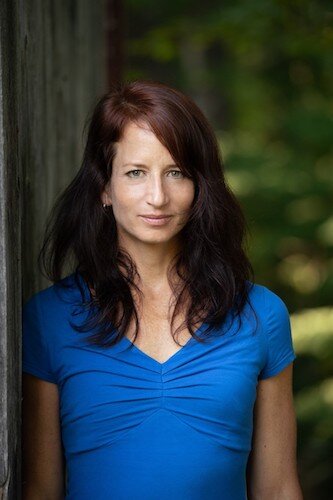Happy National Poetry Month! At Literary North, we strongly believe in the power of poetry (and pie, of course) and are excited to recommend a new anthology, You Don’t Have To Be Everything: Poems for Girls Becoming Themselves, edited by local writer Diana Whitney. This anthology, which debuted as number 9 on the Indie Bestseller list, is filled with beautiful artwork and poems that inspire, console, and encourage by poets such as Amanda Gorman, Maya Angelou, Sharon Olds, and Mary Oliver.
The Boston Globe describes this book as “(v)aried and vibrant...the collection pulses with a vital and confident energy, embracing contradictions and complexity.” It’s definitely a book we wish would have been around when we were teenagers but are so happy to be able to share it with you today.
Congratulations on this beautiful book, Diana!
You can catch Diana in virtual conversation with fellow poet, James Crews, at Phoenix Books on April 15 at 7:00 pm discussing the Poetry of Empowerment and Hope. At the final event for PoemCity Montpelier on April 30 at 7:00 pm, Diana will be in virtual conversation with poets Rage Hezekiah, Bianca Stone and Alison Prine, who are featured in the anthology.

Literary North: When did you decide to create an anthology of poetry for girls? What was the initial spark for this project?
Diana Whitney: The project began about two years ago, but in some ways I’ve been working on it since I was 13. I think everyone has a time in their past that still feels profound and unresolved, that’s tender like a bruise when you touch it. For me it’s always been adolescence, especially the early years— 12, 13, 14. Beneath my honors class exterior, I struggled with cyclical depression, self-loathing and self-harming, and carried deep shame about my sexuality. I didn’t admit to anyone, not even myself, that I was really bisexual.
So when my agent approached me about the idea of creating a poetry anthology for girls, I knew it was my chance. I wanted to collect the poems I wish I’d read when I was a teen—candid poems that give girls permission to discover themselves in all their complexity, poems from queer voices, from a diverse range of poets writing about their experiences and selves.
LN: What was the process for choosing the poems in this book like? Did you know from the start some you wanted to include? Did you make surprising discoveries as you considered poems you didn’t know already?
DW: I knew from the start I wanted to include some seminal poems that I’d loved for years: “homage to my hips,” by Lucille Clifton, “‘‘What Do Women Want?’,” by Kim Addonizio, and “Wild Geese,” by Mary Oliver. And I knew I wanted to introduce teen readers to certain “famous” women poets, like Sharon Olds and Maya Angelou. But it took time to figure out which poems of theirs to use, especially when my editor at Workman said we couldn’t use Olds’ “Ode to the Clitoris”(apparently that word is too graphic for girls age 12 and up) and I had to recalibrate.
My vision was always to include spoken word poets and Instagram stars, whose work is often dismissed in the literary world. This anthology makes no distinction between “popularity” and “quality,” and I chose poems I believed were accessible in the best way (“accessible” is sometimes a dirty word in poetry). I made many surprising discoveries in the editing process, and was delighted to find new voices like Navajo poet Paige Buffington and trans poet Joshua Jennifer Espinoza, whose poems I adore.
LN: How did you decide on the beautiful structure for You Don’t Have to Be Everything?
DW: I’m so glad you think it’s beautiful—thank you! I worked with my editor at Workman to find the right framing device for the book. Initially I considered organizing the poems by the four elements (fire, water, earth, air) but my pre/teen daughters were like, “No Mom, that’s stupid” (my girls are smart and outspoken and have their finger on the pulse of Gen Z). Then my editor suggested emotional experience as the structure, and I ran with that. I included the “dark” or negative emotions that are as familiar to teen girls as breathing—Loneliness, Rage, Shame, Sadness—and ended the book with Belonging, poems that remind us to discover our own sacredness. I wanted young readers to know they could feel all these hard feelings and still belong to our beautiful, broken, bewildering world.
LN: What were the messages that you wanted to share with teen girls that you weren’t seeing out in the wider world?
DW: My mission for the book is to encourage girls to embrace the fullness of who they are—and who they are becoming. “You are enough” is the message I hope these poems convey. Teen girls face so many pressures in our digital culture, constantly bombarded with images of so-called beauty, desirability, talent, and success while they try to fit in with their peers and discover who they are. I just wrote about this issue in a personal essay for the Washington Post’s The Lily. I believe poetry offers a kind of antidote to female shame. Some of the poems I chose push boundaries of what is “appropriate” for YA readers, addressing subjects like sexual violence, eating disorders, gender identity, and the trauma of racism. I wanted girls to feel they were not alone with their pain, that they could read about it, talk about it, even write about it themselves. That no matter what they’d been through, they were strong and complicated and worthy of love.
LN: What did you read when you were a girl? Did you read poetry? If so, did you have favorite poems or poets?
DW: As a girl I loved fantasy novels, especially those by Diana Wynne Jones, Joan Aiken, and Susan Cooper. I was the oldest of four children and my mother read to us all the time. I remember being snuggled around her as she read us Tolkien on summer nights up in Maine—I think some of that magic entered into my consciousness.
I didn’t really discover poetry until much later. In high school English class, we read the white male canon—lots of Robert Frost and W.H. Auden, an occasional Dickinson poem. The first poet I truly loved was Yeats (again, my mother’s influence), but I didn’t read contemporary poetry until I went to college and had the great good fortune to study with Cleopatra Mathis, who introduced me to many of the 20th century poets I love most today (Lucille Clifton, Stanley Kunitz, Galway Kinnell, Adrienne Rich). Their voices opened my eyes and ears and influenced my own poems.
LN: What do you think reading and writing poetry offers young people, and girls in particular, that other literature or art doesn’t offer? How does poetry help us become ourselves?
DW: I love that poetry doesn’t try to fix anything. It’s not self-help or self-improvement but often the opposite—a radical embrace of the self in the moment. The language of poetry is compressed and intensified, offering a window into the interior world. Part of what I wanted to do with this anthology was demystify poetry, to show it wasn’t difficult or opaque, that you didn’t need special knowledge or training to access it. We often turn to poetry in times of emotional crisis (a death, a wedding), but the power of language is available to all of us, every day. For teen girls especially, poetry offers a way to get beyond the surface chatter and connect with a rich inner life, and to connect with others who read and write poems.

Photo by Jeff Woodward
Diana Whitney writes across the genres in Vermont with a focus on feminism, motherhood, and sexuality. Her first book, Wanting It, became an indie bestseller and won the Rubery Book Award in poetry. She was the longtime poetry critic for the San Francisco Chronicle, where she featured women poets and LGBTQ+ voices in her column. Her essays, op-eds, and book reviews have appeared in The New York Times, The Washington Post, The Kenyon Review, Glamour, and many more. She won the 2015 Women’s National Book Association poetry prize and has received grants and fellowships from the Sustainable Arts Foundation, the Vermont Arts Endowment Fund, the Virginia Center for the Creative Arts, and the Vermont Studio Center.